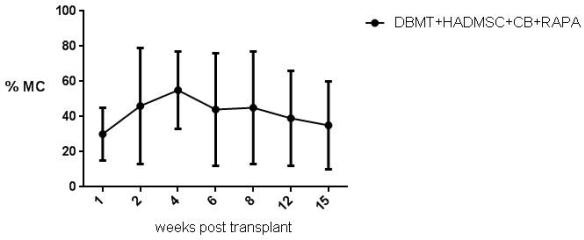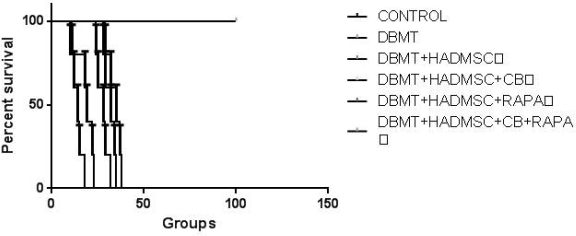Human Adipose Derived Mesenchymal Stem Cells Enhance Bone Marrow Engraftment and Induce Immunological Tolerance
1UMASS, Worcester
2Alpert Medical School of Brown University, Providence.
Meeting: 2015 American Transplant Congress
Abstract number: A255
Keywords: Tolerance
Session Information
Session Name: Poster Session A: Preclinical Immunosuppression and Tolerance
Session Type: Poster Session
Date: Saturday, May 2, 2015
Session Time: 5:30pm-7:30pm
 Presentation Time: 5:30pm-7:30pm
Presentation Time: 5:30pm-7:30pm
Location: Exhibit Hall E
Organ transplantation currently requires long-term immunosuppression. This is associated with multiple complications including infection, malignancy and other toxicities. Immunologic tolerance is considered the optimal solution to these limitations. Human adipose derived mesenchymal stem cells (HADMSC) have emerged as a promising cell population for immunomodulatory therapy in transplantation. These cells can easily obtain from adipose tissue. HADMSC have immunosuppressive properties and low immunogenicity.
We studied to achieve tolerance to skin grafts (SG) through mixed chimerism (MC) by simultaneous skin graft and non-myeloablative donor bone marrow transplantation (DBMT) +/- HADMSC. All recipients received rapamycin and CTLA-4 Ig without radiation.
DBMT+HADMSC combined with costimulation blockage and rapamycin led to stable mixed chimerism, expansion of Tregs population and donor-specific skin graft tolerance. The flow cytometry analysis revealed that recipient mice developed 15%-85% chimerism. The skin allografts survived long term. Elimination of HADMSC failed to induce mixed chimerism and tolerance.


Our results demonstrate that donor specific immune tolerance can be effectively induced by non-myeloablative DBMT-HADMSC combination without any additional cytoreductive treatment. This approach provides a promising and non-toxic allograft tolerance strategy.
To cite this abstract in AMA style:
Saidi R, Rajeshkumar B, Agrawal P, Rashighi M. Human Adipose Derived Mesenchymal Stem Cells Enhance Bone Marrow Engraftment and Induce Immunological Tolerance [abstract]. Am J Transplant. 2015; 15 (suppl 3). https://atcmeetingabstracts.com/abstract/human-adipose-derived-mesenchymal-stem-cells-enhance-bone-marrow-engraftment-and-induce-immunological-tolerance/. Accessed February 17, 2026.« Back to 2015 American Transplant Congress
